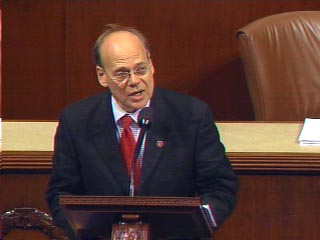
NASHVILLE, Tenn. (BP)–The injustice of slavery, “Jim Crow” segregation laws and racist attitudes that linger in American society demand an apology, the U.S. House of Representatives acknowledged July 29 in a resolution adopted on a voice vote at the nation’s capitol.
House Resolution 194, authored by Steve Cohen, a white Democrat from Tennessee who represents a majority black district in Memphis, admits that a genuine apology for “centuries of brutal dehumanization and injustices” is “an important and necessary first step in the process of racial reconciliation.” It recognizes that in 2003 President George W. Bush called American slavery “one of the greatest crimes of history” and that “many of the issues that still trouble America have roots in the bitter experience of other times.”
Speaking from the House floor in support of his resolution, which had 120 co-sponsors, Cohen said: “This is a symbolic resolution but hopefully it will begin a dialogue where people will open their hearts and their minds to the problems that face this country, from racism that exists in this country on both sides and which must end if we’re to go forward as the country that we were created to be and which we are destined to be.”
The resolution apologizes to African Americans on behalf of the people of the United States “for the wrongs committed against them and their ancestors who suffered under slavery and Jim Crow” and expresses a commitment “to rectify the lingering consequences of the misdeeds committed against African Americans under slavery and Jim Crow and to stop the occurrence of human rights violations in the future.”
The resolution marks the first time that the federal government has ever formally apologized for slavery or racial segregation in United States history, a new release at Cohen’s website stated.
“Apologies are not empty gestures,” Cohen said in the news release, “but are a necessary first step towards any sort of reconciliation between people.”
The resolution represents “a milestone in our nation’s efforts to remedy the ills of our past,” Rep. Carolyn Cheeks Kilpatrick, chairwoman of the Congressional Black Caucus, told the Associated Press.
Five state legislatures have issued apologies for slavery, the AP reported, but Congressional resolutions have stalled in the past, in part because of concerns that such an apology would result in demands that African Americans be compensated for the effect racism has had on their lives.
As far back as 1939, the Southern Baptist Convention adopted a resolution that expressed “a deep sense of sorrow and shame” over the continued practice of lynchings and recognized that “inequalities and injustices … still exist” in matters such as public school funding, unequal and impartial administration of justice, inadequate wages and the lack of opportunity for African Americans. The resolution pledged that Southern Baptists would “use our influence and give our efforts” to correct those inequalities and secure opportunities for “full development in [the] education, industrial and religious life” of African Americans.
In 1995, messengers to the 150th annual meeting of the Southern Baptist Convention that its “relationship to African-Americans has been hindered from the beginning by the role that slavery played in the formation of the Southern Baptist Convention.” The resolution apologized to African Americans “for condoning and/or perpetuating individual and systemic racism in our lifetime” and resolved “to eradicate racism in all its forms from Southern Baptist life and ministry.”
At the time, Charles Carter, chairman of the SBC’s resolutions committee, acknowledged that implementing such a resolution is no easy task.
“Words such as we are trying to say here must be authenticated by action,” Carter told a USA Today reporter. “Doing this today is far easier than it may be to implement it locally and personally.”
The Southern Baptist Convention has continued to diversify in its racial and ethnic makeup. In 1995, approximately 1,600 predominantly black churches were affiliated with the Southern Baptist Convention, according to the USA Today article. By 2005, that number had risen to 3,038, according to convention records, and there also were 2,827 Hispanic congregations, 1,551 Asian congregations and 427 Native American congregations.
–30–
Compiled by Mark Kelly, an assistant editor with Baptist Press.

















